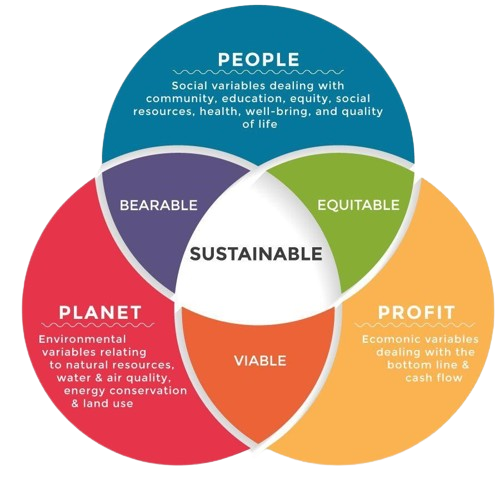Written by Dr. Niraalee Shah
Tourism plays a vital role in India’s economy, cultural exchange, and global recognition. The country’s rich heritage, diverse landscapes, and vibrant traditions make it a compelling destination for travellers worldwide. However, with the rapid growth of the tourism industry, it is essential to prioritize sustainability and minimize the environmental and socio-cultural impacts of tourism activities.
This article explores the concept of tourism sustainability in India, highlighting the initiatives, challenges, and the path to achieving a greener and more responsible tourism sector.

THE IMPORTANCE OF TOURISM SUSTAINABILITY:
Tourism sustainability refers to the practice of promoting responsible tourism development that conserves natural resources, preserves cultural heritage, and benefits local communities. Embracing sustainability in the tourism sector is crucial for several reasons:
- Environmental Protection: Sustainable tourism minimizes the ecological footprint by promoting resource conservation, reducing pollution, and protecting fragile ecosystems.
- Socio-cultural Preservation: It aims to safeguard the cultural authenticity of destinations, preserve local traditions, and support the well-being of host communities.
- Economic Benefits: Sustainable tourism generates long-term economic opportunities, including job creation, community empowerment, and inclusive growth.
Traveling Sustainably
India strives towards sustainable tourism; it faces various challenges while also uncovering opportunities for progress. One major hurdle lies in balancing infrastructure development with eco-friendly practices, necessitating meticulous planning and innovative design solutions.
Waste management remains another critical issue, requiring effective systems for disposal and recycling alongside efforts to cultivate responsible tourist behaviour. Moreover, engaging local communities in tourism planning is imperative to ensure their active involvement, foster socio-economic benefits, and safeguard cultural heritage. Promoting awareness among tourists, industry players, and communities about sustainable practices is pivotal for driving positive change.
Moving forward, collaborative endeavours are essential to realize the vision of sustainable tourism in India. Governments must enact and enforce policies conducive to sustainability while providing incentives and clear guidelines for developers and operators. Industry stakeholders, including tour operators and hoteliers, should prioritize sustainability in their operations and offer eco-friendly options to travellers.
Community participation is paramount, necessitating involvement in decision-making processes, capacity building, and equitable distribution of benefits. Concurrently, raising awareness through campaigns, workshops, and educational initiatives will instil a culture of responsible tourism, ensuring a brighter and more sustainable future for India’s tourism sector.
COMMUNITY-LED SUSTAINABLE TOURISM INITIATIVES IN INDIA
In India, community organizations are pioneering innovative approaches to sustainable tourism, fostering positive impacts on both local communities and travellers. Two notable examples include the “City Walk” program by Salaam Baalak Trust and the “Women with Wheels” initiative led by Sakha Consulting Wings.
City Walk by Salaam Baalak Trust
This youth-led walking tour of Delhi not only offers a fresh perspective of the city but also serves as a platform for youth to develop essential skills. Funds generated from the program support scholarships, job placements, and shelter resources. Over 33 guides, including girls, have participated, with many leveraging their experiences to pursue higher education and careers in various sectors.
- 37 Youth Guides Trained
- 8,000+ Children and Youth Benefitting

Women with Wheels by Sakha Consulting Wings
Challenging societal norms, this program empowers women by providing opportunities in traditionally male-dominated fields, such as professional driving and logistics. With over 1,193 women trained as professional drivers and initiatives like “Swayam Sakha” catering to the differently-abled, Sakha is making strides in promoting gender equality and safe transportation across India.
- 2.4 million Safe Rides Provided to Date by Sakha Drivers!
- 85 Women Employed
- 425 Community Members Indirectly Benefitting

Tourism continues to thrive in India, so it is imperative to prioritize sustainability and ensure the long-term well-being of the environment, communities, and cultural heritage.
Embracing sustainable tourism practices, India can lead the way in creating a greener and more responsible tourism sector. It requires a collective effort from government bodies, tourism industry stakeholders, local communities, and tourists themselves.
The path ahead for tourism sustainability in India lies in continued collaboration among various stakeholders. Governments need to provide policy and regulatory support that incentivizes sustainable practices and sets clear guidelines.
The tourism industry must take responsibility by adopting sustainable practices and offering eco-friendly options. Local communities need to actively participate in decision-making and receive the benefits of tourism development. Lastly, tourists themselves should embrace responsible behaviour and support sustainable initiatives.
By nurturing tourism sustainability, India can showcase its natural and cultural treasures while ensuring their preservation for future generations. A greener and more responsible tourism sector will not only benefit the environment and local communities but also enhance the overall tourism experience.
Let’s all work together to make India the capital of Sustainable Tourism for travellers worldwide.

About the author:
Dr. Niraalee Shah is the founder of Image Building and Etiquette Mapping, aimed at assisting entrepreneurs in establishing profitable businesses and brands that attract their target clientele. Her expertise lies in enabling brands to showcase their expertise, command premium pricing, and enhance customer experience through brand and customer experience strategies. As a Corporate Trainer, Author, and Consultant in various fields including Tourism, Sustainability, Hospitality, Digital Marketing, and Branding, she collaborates with entrepreneurs, professionals, and corporate entities to drive innovation and development. Dr. Shah’s work emphasizes embracing change to achieve breakthrough performance, demonstrating the significant impact even minor changes can have.


Post a comment